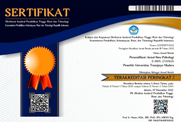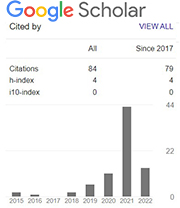Pembentukan Task Commitment Mahasiswa Underachiever Berkecerdasan Sangat Tinggi dalam Mengikuti Pembelajaran Daring
Abstract
Penelitian kualitatif ini bertujuan mendeskripsikan dinamika faktor pembentuk task commitment mahasiswa underachiever dalam mengikuti pembelajaran daring. Data dikumpulkan menggunakan teknik wawancara semi terstruktur terhadap 2 informan mahasiswa underachiever dengan IQ sangat tinggi. Hasil penelitian menunjukkan faktor pembentuk task commitment dalam mengikuti pembelajaran daring terbagi menjadi 1). faktor yang melemahkan yaitu ambiguitas standar dan kurang tepatnya dukungan orang tua, kondisi emosi negatif, waktu luang yang berlebih, keterbatasan kemampuan, academic self-efficacy, tugas yang kurang memunculkan motivasi; dan 2). faktor yang menguatkan yaitu: suasana belajar dan fleksibilitas waktu, academic resilience, kondisi emosi positif, dukungan keluarga yang tepat, dukungan teman, kemandirian, dan pandangan tentang tingkat kesulitan tugas atau minat terhadap tugas yang memperkuat task commitment. Implikasi hasil penelitian ini, diharapkan pengajar memberikan tugas dengan tingkat kesulitan yang sesuai, mempertimbangkan proporsi jenis tugas serta membangun pembelajaran dengan dukungan kelompok, serta memberikan psikoedukasi tentang kemandirian belajar mahasiwa.
Keywords
Full Text:
PDF (Bahasa Indonesia)References
Allo, M. D. G. (2020). Is the online learning good in the midst of Covid-19 Pandemic? The case of EFL learners. Jurnal Sinestesia, 10(1), 1-10. Diunduh dari (PDF) Is the online learning good in the midst of Covid-19 Pandemic? The case of EFL learners (researchgate.net) tanggal 15 Mei 2023. https://www.sinestesia.pustaka.my.id/journal/article/view/24/1
Amseke, F. V. (2018). Pengaruh dukungan sosial orang tua terhadap motivasi berprestasi. In Jurnal Penelitian dan Pengembangan Pendidikan 1(1), 65-81. http://ejournal.upg45ntt.ac.id/index.php/ciencias/index
Anggraini, V. & Neviyarni, S. (2020). The task commitment on student. Journal of Counseling, Education and Society, 1(1), 13-16. https://doi.org/10.33423/jhetp.v22i16.5610
Asmuni, A. (2020). Problematika pembelajaran daring di masa pandemi covid-19 dan solusi pemecahannya. Jurnal Paedagogy, 7(4), 281-288. https://doi.org/10.33394/jp.v7i4.2941
Bandura, A. (1997). Self-Efficacy: The Exercise of control, New York: W. H. Freeman and Company.
Basteng (2022). The impact of online learning on students: Experience in islamic universities. Shautut Tarbiyah, 28 (1), 1 – 18. http://dx.doi.org/10.31332/str.v28i1.3880
Beck, J. W., & Schmidt, A. M. (2018). Negative relationships between self-efficacy and performance can be adaptive: The mediating role of resource allocation. Journal of Management, 44(2), 555–588. https://doi.org/10.1177/0149206314567778
Cahyani, A., Listiana, I. D., & Larasati, S. P. D. (2020). Motivasi belajar siswa SMA pada pembelajaran daring di masa pandemi covid-19. IQ (Ilmu Al-Qur’an): Jurnal Pendidikan Islam, 3(01), 123–140. https://doi.org/10.37542/iq.v3i01.57
Chinyere, O. T., & Afeez, Y. S. (2022). Influence of emotional intelligence ability level of electrical/electronic technology university students on academic motivation and attitude to study. International Journal of Electrical Engineering and Education, 59(3), 191–231. https://doi.org/10.1177/0020720919840984
Eva, N., Parameitha, D. D., Farah, F. A. M., & Nurfitriana, F. (2021). Academic resilience and subjective well-being amongst college students using online learning during the covid-19 pandemic. KnE Social Sciences. https://doi.org/10.18502/kss.v4i15.8206
Faizah, I. N., Andarini, D. P., Ramadhani, E., & Nagari, P. M. (2021, September). Persepsi mahasiswa akuntansi pada pelaksanaan e-learning mata kuliah akuntansi keuangan menengah. In Proceeding National Seminar on Accounting, Finance, and Economics (NSAFE). 1 ( 4). 179-187. http://conference.um.ac.id/index.php/nsafe/article/view/863
Firmansyah, F. (2021). Motivasi belajar dan respon siswa terhadap online learning sebagai strategi pembelajaran di masa pandemi covid-19. Edukatif : Jurnal Ilmu Pendidikan, 3(2), 589–597. https://doi.org/10.31004/edukatif.v3i2.355
Fitriyah, F., Fitriyani, Y., Wafirah, M., Labib, A., & Rosowulan, T. (2021). Pendampingan manajemen waktu anak pada masa normal baru di dusun desekan kabupaten magelang. LOGISTA-Jurnal Ilmiah Pengabdian kepada Masyarakat, 5(1) 291-298. Diunduh dari https://doi.org/10.25077/logista.5.1.291-298.2021
Fitriyani, Y., Fauzi, I., & Sari, M. Z. (2020). Motivasi belajar mahasiswa pada pembelajaran daring selama pandemik covid-19. Jurnal Kependidikan: Jurnal Hasil Penelitian Dan Kajian Kepustakaan Di Bidang Pendidikan, Pengajaran Dan Pembelajaran, 6(2), 165. https://doi.org/10.33394/jk.v6i2.2654
Forsyth, D. R. (2014). Group dynamics cengage learning. http://scholarship.richmond.edu/bookshelf
Frisby, B. N., Hosek, A. M., & Beck, A. C. (2020). The role of classroom relationships as sources of academic resilience and hope. Communication Quarterly, 68(3), 289–305. https://doi.org/10.1080/01463373.2020.1779099
Herawati, M., & Suyahya, I. (2019). Pengaruh efikasi diri terhadap prokrastinasi akademik peserta didik smk islam ruhama. Prosiding Seminar Nasional Pendidikan KALUNI, 2. https://doi.org/10.30998/prokaluni.v2i0.148
Kapur, S. (2015). Adolescence: The stage of transition. Horizon of Holistic Education, 2, 233-250. https://www.researchgate.net/profile/Shikha-Kapur/publication/285302921_ADOLESCENCE_THE_STAGE_OF_TRANSITION/links/565d505d08aefe619b2554a5/ADOLESCENCE-THE-STAGE-OF-TRANSITION.pdf
Khan, M. A. (2017). Teachers with favourable and unfavourable professional attitude-a study on teaching competence and spiritual intelligence. view project parentally accepted and rejected children view project. https://www.researchgate.net/publication/327779224
Kumalasari, Azmi Luthfiyani, N., & Grasiawaty, N. (2020). Analisis faktor adaptasi instrumen resiliensi akademik versi indonesia: pendekatan eksploratori dan konfirmatori. JPPP - Jurnal Penelitian Dan Pengukuran Psikologi, 9(2), 84–95. https://doi.org/10.21009/jppp.092.06
Lazarus, R. S., & Folkman, S. (1984). Stress, appraisal, and coping. Springer publishing company.
Lindberg, E.N., Yildirim, E., Elvan, O., Ozturk, D. & Recepoglu, S. (2019). Parents' educational expectations: Does it matter for academic success?. SDU International Journal of Educational Studies, 6(2), 150-160. Doi: 10.33710/sduijes.596569. https://doi.org/10.33710/sduijes.596569
Lv, B., Zhou, H., Liu, C., Guo, X., Zhang, C., Liu, Z., & Luo, L. (2018). The relationship between mother–child discrepancies in educational aspirations and children’s academic achievement: The mediating role of children’s academic self-efficacy. Children and Youth Services Review, 86, 296–301. https://doi.org/10.1016/j.childyouth.2018.02.010
Lubis, H., Ramadhani, A., & Rasyid, M. (2021). Stres akademik mahasiswa dalam melaksanakan kuliah daring selama pandemi Covid 19. Jurnal Psikologi, 10(1), 31-39. https://doi.org/10.30872/psikostudia.v10i1.5454
Martin, G., & Pear, J. (2019). Behavior modification: What it is and how to do it. Routledge.
Mayangsari, M. D., & Nurrachmah, D. (2021). Kiat pembelajaran daring di era covid-19 sebagai upaya penerapan psikologi pendidikan pada proses belajar siswa SMP. Jurnal Pengabdian ILUNG (Inovasi Lahan Basah Unggul), 1(1), 125–133. https://doi.org/10.20527/ilung.v1i1.3586
Megawanti, P., Megawati, E., & Nurkhafifah, S. (2020). Persepsi peserta didik terhadap pjj pada masa pandemi covid 19. Faktor: Jurnal Ilmiah Kependidikan, 7(2), 75-82. http://dx.doi.org/10.30998/fjik.v7i2.6411
Minchekar, V.S. (2017). Effect of problem-focused and emotion focused coping strategies on academic stress during examinations. International Journal of Education and Psychological Research (IJEPR), 6 (3), 57-59. Diunduh dari (PDF) Effect of Problem-Focused and Emotion-Focused Coping Strategies on Academic Stress during Examinations (researchgate.net) tanggal 15 Mei. https://www.researchgate.net/profile/Vikas-Minchekar/publication/349075834_Effect_of_Problem-Focused_and_Emotion-Focused_Coping_Strategies_on_Academic_Stress_during_Examinations/links/601e81c2458515893984f244/Effect-of-Problem-Focused-and-Emotion-Focused-Coping-Strategies-on-Academic-Stress-during-Examinations.pdf
Nakayama, M., Mutsuura, K., & Yamamoto, H. (2014, July). A note taking evaluation index using term networks in a blended learning environment. In 2014 Eighth International Conference on Complex, Intelligent and Software Intensive Systems (pp. 486-490). IEEE. https://doi.org/10.1109/CISIS.2014.69
Ouherrou, N., Elhammoumi, O., Benmarrakchi, F., & El Kafi, J. (2019). Comparative study on emotions analysis from facial expressions in children with and without learning disabilities in virtual learning environment. Education and Information Technologies, 24(2), 1777–1792. https://doi.org/10.1007/s10639-018-09852-5
Pianyta, A. (2017). Pengaruh kedisiplinan dan task commitment terhadap prestasi belajar matematika JKPM (Jurnal Kajian Pendidikan Matematika), 2(1), 80-92. http://dx.doi.org/10.30998/jkpm.v2i1.1896
Pramudiani, D. (2019). Penerapan konseling direktif untuk menangani siswa underachiever di SDN Utan Kayu Utara 01 Pagi Jakarta Timur: The Application Of Direct Counseling Handle Underachiever Students Of SDN Utan Kayu 01 Pagi East Jakarta. Jurnal Psikologi Jambi, 4(1), 30-40.
https://doi.org/10.22437/jpj.v4i1.8783
Puteri, A. P., & Dewi D. K. (2021). Hubungan antara Kontrol Diri dan dukungan sosial dengan motivasi belajar pada mahasiswa psikologi universitas negeri Surabaya. Character: Jurnal Penelitian Psikologi, 8(6), 1-13. https://doi.org/10.26740/cjpp.v8i6.41517
Putri, M., Kuntarto, E., & Alirmansyah, A. (2021). Analisis kesulitan belajar siswa dalam pembelajaran daring di era pandemi (studi kasus pada siswa kelas iii sekolah dasar). AULADUNA: Jurnal Pendidikan Dasar Islam, 8(1), 91. https://doi.org/10.24252/auladuna.v8i1a8.2021
Razzaq, A., Samiha, Y. T., & Anshari, M. (2018). Smartphone habits and behaviors in supporting students self-efficacy. International Journal of Emerging Technologies in Learning, 13(2), 94–109. https://doi.org/10.3991/ijet.v13i02.7685
Reis, S. M., & Peters, P. M. (2021). Research on the schoolwide enrichment model: Four decades of insights, innovation, and evolution. Gifted Education International, 37(2), 109-141. https://doi.org/ 10.1177/0261429420963987
Renzulli, J. S. (2005). The three-ring conception of giftedness: A developmental model for promoting creative productivity. In Conceptions of Giftedness: Second Edition (pp. 246–279). Cambridge University Press. https://doi.org/10.1017/CBO9780511610455.015
Rezeki, S. M., Maisyaroh, U., Syafrizaldy (2019). Studi kasus siswa underachiever di SMA yayasan perguruan harapan mandiri Medan. Psikologi Prima, 2(2), 78-84. https://doi.org/10.34012/psychoprima.v2i2.876
Rimm, S. B. (1997). Underachievement syndrome: A National Epidemic. Hand book of gifted education, 2, 416-434.
Rimm, S. (2008). Underachievement syndrome: A psychological defensive pattern. In S.I. Pfeiffer (Ed). Handbook of giftedness in children (pp. 139-160). Boston: Springer. https://doi.org/10.1007/978-0-387-74401-8_8
Safiany, A., & Maryatmi, A. S. (2018). Hubungan self efficacy dan dukungan sosial teman sebaya dengan stres akademik pada siswa-siswi kelas xi di SMA negeri 4 jakarta pusat. Ikraith Humaniora: Jurnal Sosial dan Humaniora, 2(3), 87-95. https://doi.org/10.36805/psikologi.v4i2.743
Sarafino, E. P., & Smith, T. W. (2014). Health psychology: Biopsychosocial interactions. John Wiley & Sons.
Savage, M. W., Strom, R. E., Ebesu Hubbard, A. S., & Aune, K. S. (2019). Commitment in college student persistence. Journal of College Student Retention: Research, Theory & Practice, 21(2), 242-264. https://doi.org/10.1177/1521025117699621
Sembiring, A. B., & Oktavianti, R. (2021). Persepsi siswa SMA selama pembelajaran daring saat pandemi covid-19. Koneksi 5(1), 120-126. https://doi.org/10.24912/kn.v5i1.10191
Siegle, D. (2018). Understanding underachievement. In Handbook of Giftedness in Children: Psychoeducational Theory, Research, and Best Practices (pp. 285–297). Springer International Publishing. https://doi.org/10.1007/978-3-319-77004-8_16
Snyder, K. E., & Adelson, J. L. (2017). The development and validation of the Perceived Academic Underachieve ment Scale. The Journal of Exper imental Education, 85(4), 614-628. https://doi.org/10.1080/00220973.2016.1268087
Snyder, K.E., & Wormington, S.V. (2020) Gifted Underachievement and Achievement Motivation: The Promise of Breaking Silos. Gifted Child Quarterly, 64(2), 63-66. https://doi.org/10.1177/0016986220909179
Syarifa, A., Mustami’ah, D., & Sulistiani, W. (2011). Hubungan antara dukungan sosial orang tua dengan komitmen terhadap tugas (task commitment) pada siswa akselerasi tingkat SMA INSAN. Fakultas Psikologi, Universitas Hang Tuah Surabaya, 13(1).
http://journal.unair.ac.id/filerPDF/artikel%201-13-1.pdf
Tatlah, I.A. (2019). Parental expectations and its impact on academic achievement of students mediated by academic self-concept at secondary level. Paper presented in 13th International Technology, Education and Development Conference. https://doi.org/10.21125/inted.2019.0150
Tayibu, N. Q. (2017). Pengaruh intelegensi, task commitment dan self efficacy terhadap hasil belajar matematika siswa SMA. Journal of Educational Science and Technology (EST), 2(3), 132–143. Diunduh dari Pengaruh Intelegensi, Task Commitment Dan Self Efficacy Terhadap Hasil Belajar Matematika Siswa SMA - Neliti tanggal 15 Mei 2023 https://doi.org/10.26858/est.v2i3.2104
Uno, H. B. (2021). Teori motivasi dan pengukurannya: Analisis di bidang pendidikan. Bumi Aksara.
Utami, E. W. (2020). Kendala dan peran orangtua dalam pembelajaran daring pada masa pandemi covid-19. Prosiding Seminar Nasional Pascasarjana (PROSNAMPAS). 3(1), 471-479. https://doi.org/10.35438/cendekiawan.v3i1.215
Utomo, S. B. (2019). Pengaruh pola asuh demokratis dan dukungan emosi teman sebaya terhadap motivasi belajar siswa kelas XI SMAN 1 Wonosari Gunung Kidul. Prosiding Seminar Nasional Magister Psikologi Universitas Ahmad Dahlan ( 485- 493). Diunduh dari Pengaruh pola asuh demokratis dan dukungan emosi teman sebaya terhadap motivasi belajar siswa kelas XI SMAN 1 Wonosari Gunung Kidul | Semantic Scholar tanggal 15 Mei 2023
Vogel, F. R., & Human-Vogel, S. (2016). Academic commitment and self-efficacy as predictors of academic achievement in additional materials science. Higher Education Research & Development, 35(6), 1298-1310. https://doi.org/10.1080/07294360.2016.1144574
Willig, C. (2013). Introducing qualitative research in psychology. UK: McGraw-hill Education.
Wolters, C. A., Won, S., & Hussain, M. (2017). Examining the relations of time management and procrastination within a model of self-regulated learning. Metacognition and Learning, 12(3), 381–399. https://doi.org/10.1007/s11409-017-9174-1
Yuliati, Y., & Saputra, D. S. (2020). Membangun kemandirian belajar mahasiswa melalui blended learning di masa pandemi covid-19. Jurnal Elementaria Edukasia, 3(1) 142-149. http://dx.doi.org/10.31949/jee.v3i1.2218
DOI: https://doi.org/10.21107/personifikasi.v15i2.26583
Refbacks
- There are currently no refbacks.
Copyright (c) 2024 Emilia Margalo, Evy Evy Tjahjono, Aniva Kartika, Diana Diana

This work is licensed under a Creative Commons Attribution 4.0 International License.


Personifikasi by Universitas Trunojoyo Madura is licensed under a Creative Commons Attribution 4.0 International License.










